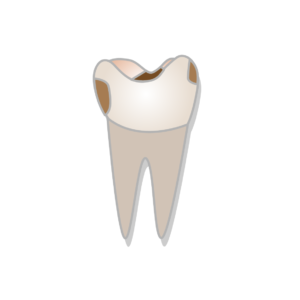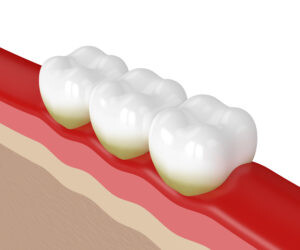How Does Pregnancy Impact Oral Health?
A mother’s oral health standing is a strong predictor of how her child’s oral health will be in the future. Although, many women are not educated about the importance of good oral health during pregnancy and tend to neglect dentist visits.
“Statistics show that 56 percent of women do not have any dental care during pregnancy. 59 percent of women do not receive prenatal oral health counseling.”
The primary reason for neglected oral care is due to the misconceptions around the safety of treating pregnant women. This includes routine teeth cleanings, cavity fillings, dental crowns, and gum disease treatment. However, receiving dental treatment while pregnant is completely safe and encouraged. The earlier dental conditions are treated, the better your child’s oral health will be as they grow up.
Common Dental Conditions
The hormonal changes that occur during pregnancy can result in poor oral health outcomes, such as cavities and gum disease. Prenatal and postpartum counseling is crucial to ensure you understand the risks that poor oral health poses for you and your baby. Common risk factors include:
Cavities
Frequent snacking may increase your risk of developing cavities (tooth decay). Cavities form due to a buildup of plaque, which is a sticky film of bacteria that forms on the teeth. If you have untreated cavities before pregnancy or develop them during pregnancy, the decay-causing bacteria can transfer to your baby after birth.

“A child is three times more likely to develop cavities if their mother has high levels of untreated tooth decay.”
Transmission can occur through direct contact, such as sharing utensils or kissing your baby on the lips. This significantly increases your child’s risk of developing cavities in the future and may also lead to low infant birth weight. To prevent the spread of cavities from mother to baby, your dentist will recommend restoring them as soon as possible. Basic dental procedures, such as fillings and crowns, are completely safe to get during pregnancy.
Loose Teeth
Some women experience loose teeth during pregnancy, which is usually nothing to worry about. This is because estrogen and progesterone are capable of loosening the bones and ligaments that keep your teeth positioned correctly, even if gum disease is not the cause. After pregnancy, your teeth should not be loose anymore. However, if a tooth falls out while you’re pregnant, it is typically due to an underlying untreated dental condition, such as extreme decay or periodontal disease.
Gingivitis
Pregnancy results in extreme hormonal changes, which can increase inflammation in the body. As a result, roughly 60 to 75 percent of women develop gingivitis while pregnant. Gingivitis is characterized as the inflammation of the gingiva (gums). It is a minor, reversible form of gum disease that is easily treated with teeth cleanings If gingivitis is left untreated, it can turn into periodontal disease (PD), which results in permanent bone loss. Bleeding and tooth loss can also occur over time. Risks of PD during pregnancy include:

- Poor pregnancy outcomes, such as preterm birth or low birth weight.
- Gum disease bacteria can be spread from mother to baby through contact after birth.
Dental Erosion
Frequent vomiting during the first 12 weeks of pregnancy is common. It is typically nothing to worry about unless oral hygiene is neglected. If vomiting is prolonged or occurs during more than one pregnancy, dental erosion can form. Erosion is a chemical process that results in the permanent loss of tooth enamel. In other words, since stomach contents are highly acidic, tooth enamel can wear away over time.
Prenatal Period – Keeping Your Oral Health Intact During Pregnancy
Regular Teeth Cleanings, X-Rays & Dental Exams
teeth cleanings, x-rays, and dental exams are completely safe to get during pregnancy. In addition, you should still visit your dentist every six months to receive preventive care. Depending on your situation, a dentist may even recommend more visits while your pregnant.
If you need restorative work done, dentists recommend scheduling appointments before the third trimester. For invasive procedures that involve sedatives, such as dental implants, it may be best to wait until after you give birth. Professional teeth whitening and cosmetic treatments should also be scheduled after your baby arrives.
Food Choices and Nutrition
Abnormal and unhealthy food cravings are normal during pregnancy. Although, it is still vital to eat enough healthy foods throughout pregnancy to help your baby’s teeth form properly. This includes a mixture of fruits, vegetables, proteins, and unrefined grains.
According to the American Dental Association (ADA), your baby’s teeth begin developing under the gums between the third and sixth months of pregnancy. Eating a nutritious and balanced diet can help them form correctly.
Postpartum Period – Keeping Your Baby’s Oral Health Intact After Pregnancy
Preventing Baby Bottle Tooth Decay
A baby’s first tooth erupts no later than 1 year of age. Excessive bottle-feeding or allowing a baby to drink from a bottle in bed can result in tooth decay. If the substance in the bottle is anything but water, the front teeth will bathe in it, ultimately causing cavities. To help prevent tooth decay, dentists recommend utilizing these tips:
- Visit a pediatric dentist for regular teeth cleanings and exams after the first tooth erupts.
- Routinely check newly erupted teeth on a regular basis for signs of decay, such as tooth sensitivity and light brown spots on the enamel.
- Make sure your baby is drinking fluoridated water.
- Brush your baby’s teeth with fluoride toothpaste.
- Clean the gums directly after breastfeeding or bottle-feeding.
- Never send your baby to bed with a bottle.
- Eliminate sugary drinks, such as fruit juice.
Breastfeeding and Dental Health
After breastfeeding, it is important to wipe your baby’s gums with a soft washcloth. Since breast milk contains sugar, cleaning the gums helps reduce the chance of cavity formation once primary teeth grow in. Breastfeeding during the first year of life has a few oral health benefits, including:
- Frequent breastfeeding reduces the risk of baby bottle tooth decay.
- Your child may develop a better bite once his or her teeth grow in. This reduces the need for orthodontic treatment later in life.

